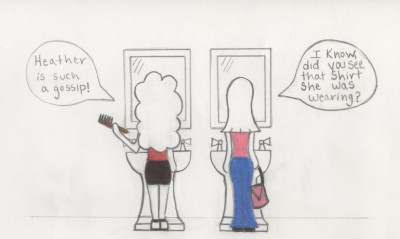
People like to talk. When you give people something to talk about, you have released a piece of personal information into a vicious cycle; one in which there are no rules or regulations. But the one group of people within Staples that seems to have created a barrier between their personal discussions and the gossips of the school is called Peer Advisors.
On March 22, I accompanied my close friend to a peer meeting. It was “bring a guest day,” so each member of the group brought along a friend, a significant other, a sibling, etc. The group consisted of sophomores, juniors, and seniors. The room was bustling with an eagerness to commence the conversation.
Peer Advisors is a group reputed for being an open forum to discuss any topic at any extent. Frequent topics of discussion include: sex, drugs, bullying, family life, and general fears. Adult advisor Michael Newman, a certified therapist, maintains a therapeutic tone throughout the discussions and instills a common trust among the students. The group is especially beneficial for students who go through traumatic experiences during their high school years.
From 6 to 8 p.m., we covered a wide span of topics that certainly required me to open up and even step out of my comfort zone. As the meeting came to a close, Newman made an announcement to the whole group. He asked those of us who were guests to kindly not repeat any of the personal information that was revealed during the day’s discussion because that is part of Peer group’s code of conduct, in accordance with a contract that each person is required to sign once they’ve been accepted to the group.
This instantly triggered a series of memories when I have talked to friends who are members of Peer Advisors and they said something along the lines of, “Oh, I can’t tell you that because it was discussed in Peer.” I am not out to deny that this policy of confidentiality is not a great thing. Peer helps so many students externalize their problems, and emphasizes the importance of communication and leadership skills.
The thing that got me thinking, however, was the fact that it is essentially a signed contract that keeps these students from repeating the private matters that are voiced during the meetings. Although the contract is not the only thing that enforces confidentiality, it certainly has a significant effect. So what does this say about the rest of the Staples Community, or for that matter, any teenager who has participated in the rapid-fire spread of confidential information?
It seems as if the general notion within Staples is that the game of gossip is a free for all. If there is no physical contract that withholds people from repeating the business of others, people don’t see the harm in doing so.
From a Hobbesian perspective, Staples students need order. There needs to be someone standing in front of our faces with a big red octagon telling us to “stop.” Even among friends, who promise each other to uphold confidentiality, there is no way to be sure that your embarrassing story from last weekend won’t be posted on someone’s Facebook wall within the next 24 hours.
Gossip, in a sense, is viral. To have possession over someone else’s secret, to have verbal proof of somebody else’s actions, or to have evidence of how someone else truly feels, is like having the world in your hands. Obtained gossip is valuable, and the process of passing it on is quite strategic. If it is shared with the right people, the gossiper can gain respect from a network of people who will use the gossip to their advantage.
On the contrary, when gossip is shared with the wrong person, the gossiper normally becomes susceptible to a plethora of unwanted social conflicts and turmoil. However, this doesn’t seem to faze everyone. It is just too tempting to not pass it on, too difficult to keep it to one’s self.
It seems to be a natural human tendency. It would be an impractical request to ask people to “stop the gossip.” Peer Advisors have certainly discovered a way to reduce it, but not every Staples student has the opportunity to be part of the group. And so I am left with the answer to my question–– what does the lack of confidentiality within Staples say about its students? I have concluded that not everyone in Staples is your true friend. So maybe we are bad at detecting trustworthiness in a person. Maybe we are the ones at fault because we are too willing to vent to others.
For now, the only defense in this game of gossip is a legitimate team. If we want our secrets to stay within an intimate group of people, we need to be sure that our secrets are safe. So Staples, befriend wisely.













































